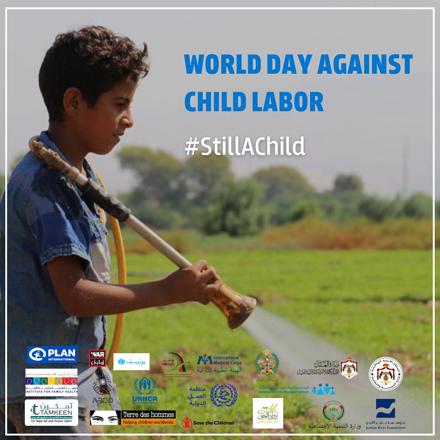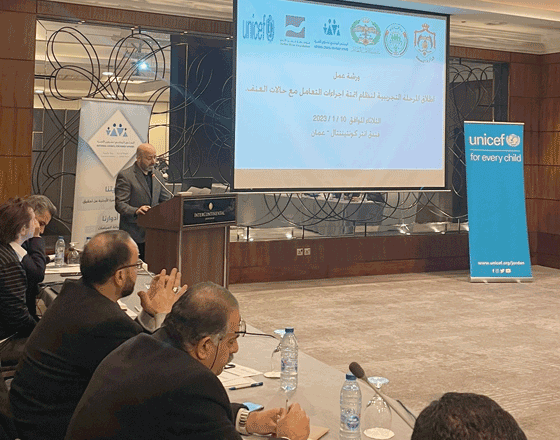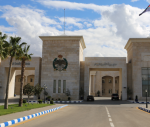You are here
NCFA, UNICEF launch National Strategy for Juvenile Justice 2024-2028 with focus on child protection, rehabilitation
By JT - Nov 22,2023 - Last updated at Nov 22,2023
AMMAN — Under the patronage of the minister of social development, Wafaa Saed Bani Mustafa, and the secretary-general of the National Council for Family Affairs (NCFA), Mohammad Miqdadi, and in partnership with UNICEF, the National Strategy for Juvenile Justice 2024-2028 was launched on Wednesday.
Following the National Strategy for Juvenile Justice Cabinet approval on September 3, the strategy sets forth a comprehensive plan to decrease juvenile delinquency, enhance the efficiency of juvenile justice procedures and improve rehabilitation and care for vulnerable children and youth.
Barq Al Dmour, the secretary-general of the Ministry of Social Development and the representative of the minister of social development, has affirmed that the Ministry's mission is centered on providing the best services to groups in need of protection and care through a fair and participatory approach aimed at strengthening social justice.
These objectives are realised through the enhancement of organisational efficiency, the optimal utilisation of resources and the establishment of local and international partnerships. Furthermore, he emphasised the ministry's unwavering dedication to fostering a supportive environment for children who benefit from its services, with the ultimate aim of safeguarding their rights, meeting their needs and actively working towards their reintegration into society.
Dmour also emphasised the ministry's significant contributions to the development and support of the legislation that upholds children's rights and facilitates the reintegration of children in conflict with the law back into their families and communities through rehabilitative programmes designed to aid in their reintegration.
He further stressed that the ministry's involvement in the implementation of the National Strategy for Juvenile Justice 2024 — 2028 underscores the government's unwavering commitment to embracing a contemporary perspective on juvenile justice, with the primary focus on providing services that prioritise the best interests of the child.
Mohammad Miqdadi, secretary-general of the NCFA, stated, "Developed in partnership with the steering and technical committees for juvenile justice, building on the successes of the initial strategy covering 2017-2019. The updated strategy addresses the identified need to expand services, including social, psychological and legal support for juveniles.”
The strategy focuses on restorative justice, aiming to reduce juvenile crime, prevent recidivism and guarantee equitable treatment for all youths in conflict with the law. It encompasses a systematic approach, integrating case studies and risk assessments to identify and provide necessary services.
In line with Juvenile Law No. 32 of 2014 and Child Rights Law No. 17 of 2022, the strategy also supports the Sustainable Development Goals. Key pillars include legal and legislative frameworks, service provision, awareness and prevention, coordination and networking, plus human resources and training.
UNICEF representative to Jordan, Philippe Duamelle, said: “Children in contact with the law are victims who need specialised support and protection as they navigate the justice system, as well as a second chance to reintegrate meaningfully into society.
“UNICEF is pleased to have partnered with the Ministry of Social Development and NCFA to develop this strategy to further enhance the child protection and juvenile justice systems in Jordan and ensure they are more child-friendly and responsive to the needs of vulnerable children.”
The launch event included a video presentation that discussed the vision, mission and goals of the strategy, in addition to the strategic pillars, which include the awareness and prevention pillar, the legislation pillar, the services pillar and the coordination and collaboration pillar. It also highlighted the key activities within these pillars. The event also featured a panel discussion in which the main implementing partners.
Related Articles
AMMAN — Child Labour Task Forces that include ministries, governmental entities, organisations and associations on Sunday launched a s
AMMAN — The National Council for Family Affairs (NCFA) on Wednesday completed four manuals to standardise response procedures to gender-base
AMMAN — The National Council for Family Affairs (NCFA) on Tuesday held a workshop in preparation of the pilot phase of the automation system

















